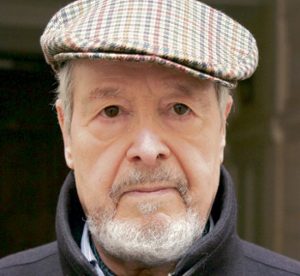You can always count on the State of Israel to be an embarrassment. Every time Netanyahu or Mark Regev appears on TV, even the most hardened Zionist takes a sharp intake of breath in terror at what they’re about to say. If Israel is in the news, it’s always because they’ve done something awful. You expect the worst and you’re never disappointed. Embarrassed, sure, but never disappointed.
Israel knows what it is. Much to the chagrin of liberal Zionists in America and the UK, Netanyahu has a much better sense of what Israel is than they do. It is a pariah state in the Middle East, functioning on a combination of apartheid, despair and denial. Netanyahu understands that and embraces it. That’s why he keeps getting re-elected.
Years ago, the Zionists made a decision about the kinds of Jews they were going to be. Not religious ones. Zionism was secular in outlook and approach – opposed to religious power and full of love for the modern state. Not cultural ones. They systematically eradicated Eastern Ashkenazi language, Western Ashkenazi culture and Maghrebi Jewish people. They weren’t even going to base their Jewishness on ethics. What did they care about ethics?
The Zionists decided that they were going to be Jews with guns.
Whatever they might lose of their religion, culture, language, ethics or history, at least they would have a state. For Jews who understand themselves by their relationship to Israel, that is all that matters. They and their families don’t need to participate in Jewish communal life. The synagogue, the yeshiva, the hamam, the theatre and the food mean nothing to them. As long as they have a flag in their hand and their state is safe, their identity is secure.
Watching the dramatic fallout from Chicago Dyke March, it’s becoming increasingly clear that many anti-Zionist Jews have no such security in who they are. They have no idea who they are or what being Jewish is. They have become an embarrassment of a completely different kind.
Here’s what happened, for anyone who doesn’t follow disastrous decisions of the left with enough trepidation to have missed it.

Chicago Dyke March put on a pretty radical alternative to the boring, corporatized parade happening elsewhere in the city. They put together some kind of programme for the destruction of the racist capitalist hetero-patriarchal military-industrial complex that British people find cringingly earnest, but North Americans seem to love. Somebody turned up with a blue Magen David (a Star of David) on a rainbow background. The organisers (a combination of anti-Zionist Jews and Palestinians) saw it and went up to challenge the people waving the flag about their views on Israel. When it turned out they were Zionist, they were asked to leave.
Oy.
Ensuing debates have focused on whether the people with the flag went there innocently or provocatively. Did they go there thinking that waving a Magen David would be OK or did they set out to be a disruptive nuisance? Let’s assume it was the latter. I have no idea what the assorted intentions were, but let’s assume, for argument’s sake, that they turned up with a Magen David on a rainbow in the hope of eliciting a reaction.
How did the organisers actually respond? They saw the Magen David, went up to the people holding it, and demanded to know their views about Israel. Then, they kicked them out.
After years of Jewish anti-Zionists trying to persuade people that Jewish identity is so much richer than Zionism and that you shouldn’t see a Jewish symbol and equate it with Israel, the Dyke March organisers plunged right in there and made the deliberate connection. After years of Jewish anti-Zionists insisting that it was a matter of basic decency not to demand to know the views of Jews on Israel the moment you meet them, the organisers of Dyke March decided to do just that.
If they were being baited, they took the bait, swallowed the fishing rod, and asked if they could have some more.
A mistake, perhaps. A chance for the organisers to reflect on why nobody outside their immediate echo chamber was applauding them, perhaps. A chance to acknowledge antisemitism and then bring the conversation back to the more important issues Dyke March was trying to address, like occupation and apartheid, perhaps.
Nope.
Supporters of this decision rallied in with the most bizarre defences imaginable. They weren’t just going to defend anti-Zionism on principle, or the idea of organisers choosing who they want on their own marches. They literally decided to defend getting rid of the Magen David.
I’ve collected some examples of these arguments. I’ll start with the funniest first, found in a Facebook group:
The other aspect of this worth considering is that after all, the Magen David is *inherently* a symbol of Israel because its entire significance is specifically in relation to King David defeating the Philistines for control of Canaan and uniting the Jews into the Kingdom of Israel. So can we really separate its connection to the Zionist state? It seems like its whole meaning is connected to that land and the Jewish presence in it, and (much more to the point), control of it.
So it turns out you can put words in whatever order you want.
The person who made this comment didn’t understand what any of the following words mean: inherently, symbol, Israel, Canaan, meaning, presence, of. Let’s break them down a little.
- Symbols don’t have inherent meaning – people give symbols meaning by how they engage with them. Symbols usually have multiple and conflicting meanings, which is why a swastika on a Hindu Temple has such a different meaning to one on a synagogue.
- The state of Israel was founded in 1948. The Kingdom of Israel existed for a century about 3000 years ago in land that stretched from modern-day Egypt to modern-day Syria and right across the Jordan. It did not include Philistia, which was a neighbouring nation to the west, along the modern-day Gaza Strip. As with its other neighbouring nations, Edom, Amon and Amalek, Israel was engaged in constant resource wars. That’s where the myth of the young King David defeating the Philistine giant Goliath comes from. Canaan is the name given to the whole Levantine region of the era, from Phoenicia (Lebanon) to Egypt.
- There are no Jewish anti-Zionists who are opposed to Jewish presence in the region (or at least I didn’t think there were, until this mess began unfolding). We are opposed to the state and its military institutions, not where Jews live. The watchword of anybody serious about opposing nationalism has been open borders, not returning all people to where they were “originally” from. Settlers will need to leave settlements, but the idea that Jewish presence in the Levant is a problem is not serious anti-Zionism. It is reactionary antisemitism.
Alright, I don’t want to set up a strawman. The person who wrote this may have done so hurriedly and without much knowledge of Jewish history. The person who wrote the next comments does not have such a defence. They are very well-versed in Jewish history, claim to be a “proud Jew” and have clearly been active for a while. Theirs is possibly the most well-shared response from a ‘Jewish anti-Zionist’ to the incident:
It is also important to say something about the role of Jews in explicitly anti-Zionist spaces. Namely, it is never the place of Jews to tell Palestinians how, where, why, and at what they are allowed to feel uncomfortable, unsafe, or traumatized [sic], and in which contexts. Palestinians always have the right to determine the terms of their own safety in their own spaces. Always. It is neither the place, nor the right, of Jews to get all up in our feelings about the reactions of Palestinians to symbols that have been heavily appropriated by the Israeli State and Zionist settlers for the express purpose of eliciting reactions of fear and trauma.
We don’t decide what our religious symbols mean, Palestinians do! We don’t decide how we feel about our community, Palestinians do! We are here to kneel before the vanguard and serve them! Five years ago, the celebrated Jewish pro-Palestinian academic and activist, Norman Finklestein, made waves in the community when he said that BDS was a cult. Even most of the people who fervently believe in boycotts, divestment and sanctions (like myself) privately acknowledged that he had a point about the platform. One of the things a lot of people missed was that he pointed out that some of the Jews involved lacked self-respect. In fact, that point was the most important and the most ignored because it was the most true. Consider this, as the same writer continues:
This means that when Jews enter an anti-Zionist space, we accept that we are entering it under certain conditions. As beneficiaries of the system of power and control that those spaces were set up to combat and dismantle, we may be held to a higher political standard. We may be required to affirm certain political positions in order to remain in the space. We may be asked certain questions about our politics because of our positions of privilege. And all of those things might feel bad, might hurt our feelings, and might seem really unfair to us… but it is our job to remember, and to remind each other, that our discomfort and hurt feelings at being held to a higher standard is nothing, NOTHING, compared to the genocide, violence, and ethnic cleansing that we are in those spaces to help put to an end.
This is performance politics at its peak. Not only should the person come in with no sense of emotion about the most fraught political nightmare of the 21st Century, but they should renounce all sense of identity and politics. They should discard their own views as irrelevant. They should expect, as Jews, to be automatically interrogated about their views. They should expect, as Jews, to be held to a higher standard than their peers. This “proud Jew” sounds a lot like an antisemite.
I’ve often wondered why this style of self-flagellation is so popular in certain activist circles. It seems to be a point of pride among some just how loudly and aggressively they can remonstrate themselves for their own privileges. It only really happens on the internet, but it gets a lot of kudos. Freud wrote a while ago about the pleasure people can get from moral masochism. Particularly in group situations, public displays of humility can help stimulate the senses, bring communities together and even instigate euphoria. The fasts of Yom Kippur and Tisha b’Av trade on exactly this principle. We are guilty! We are nothing! We bow before you!

It may feel good, but it can’t ever be the basis for an emancipatory politics. For that, people need a sense of dignity in who they are and a wish to extend it to others. Meditations on privilege don’t help oppressed people. They just reassure the oppressors that they’ve fulfilled the requisite of self-effacement but leave all the same power structures intact. An emancipatory movement needs people with a sense of identity, purpose and ethics. Do these ‘anti-Zionist Jews’ have any such thing?
If they do, where do they ground themselves? Very few of them are religious. Most are avowed and unreconstructed atheists. Perhaps their parents pay their membership of a synagogue in their hometown, but very few seem to have any connection to their religious community. They don’t lead Jewish lives that involve taking on its mitzvot, its signs of visibility or its communal practices. And what if they did? If they have decided to hand over every Jewish symbol to the Zionists, they will have nothing left. The Kotel is an enduring symbol of the occupation. The knitted kippah is ubiquitously associated with Naftali Bennet and the nationalists. The menorah is on the flag of the Knesset. The shofar is sounded for nationalist mourning. What could possibly be left to them to practise their religion?
Perhaps they ground themselves in their cultures? Not at all! The loudest voices in this movement are actively opposed to their ancestral cultures. They make great shows of how aware they are of their ‘Ashkenazi privilege’, much to the bemusement of their Sephardi and Mizrahi cousins. They won’t learn Yiddish or engage in the practices of their grandparents because these are the trappings on Ashkenormativity. I wonder how many of them realise that this is a phenomenon dating back to the Haskalah, when Eastern European Jews made a big deal of North African and Middle Eastern Jews whom they had never met but to whom they attributed every possible positive quality as they erased their own cultures. This was a big part of the early Zionist project to assimilate Jews into the world of colonial nation-states. Historians call it ‘the Sephardi mystique’. It is a racist and patronising way for Ashkenazim to construct their cultures, but it attracts a lot of applause from people who consider themselves right-on.
They deny their own religion, their own culture and their own history. They even deny their ancestral languages. In one of the funniest comments coming out of this fiasco, one ‘anti-Zionist Jew’ suggested that ‘allies’ should avoid modern Hebrew and only use biblical Hebrew. Rav Kook would be so proud! But how is anyone going to tell the difference? And, more importantly, how will they talk about telephones, computers and microwaves?

Without religion, culture or history to ground them, where does their Jewishness come from? It seems to be based only on a negative. They are Jews because they’re not Christians. They are Jews because their parents were. They are Jews because a grandparent was.
Sartre identified this problem in the last century, when he said “the antisemite creates the Jew.” That was how all the Jews he knew seemed to see themselves. The Jews he met just based themselves on what they weren’t – they were only aware of who they were when they noticed they weren’t part of the mainstream. These supporters of Dyke March take that to a new level: they are Jews because they are opposed to Israel. That is the beginning and end of their Jewishness. They are not Christians, they are not like the mainstream, and they are not like other Jews. What a negative base!
Certain people challenged Sartre and disagreed with him. Jews, they said, were not just made by their enemies, but created themselves. They set about showing how Jews had created their own history, of which they could be proud. Albert Memmi, the anti-colonial theorist, drew attention to the great successes of Jewish culture. He found dignity and pride in his community in Tunis and in his new home in Paris. He presented a version of Jewishness created by Jews.
Gershon Sholem refused to write histories of what people had done to Jews. He decided to focus on what Jews had built for themselves. His beautiful histories of Chassidism, Sabbateanism and other mystic sects helped Jews gain their first awareness that history was something they participated in, rather than a serious of attacks inflicted on them.
They wouldn’t let Jews be defined by guilt or negativity or subjugation. They wanted to create proud Jews with a sense of self-respect. It was perhaps for this reason that both were early supporters of Zionism. They were nationalists in response to a feeling that religious Jewishness was dead and that Jewishness itself would die if it was not transformed. They wanted to make Jews proud.
The tragedy of their optimism is that they were wrong. Zionism has not made us proud. The state of Israel is an embarrassment. Who could be anything but horrified at the sight of eighteen-year-old Jews handling machine guns? What self-respecting Jew feels anything but disgust seeing the Magen David erected over a checkpoint on the Apartheid Wall? Who with any sense of Jewish ethics has not burned with rage at the daily atrocities, humiliations and abuses carried out against Palestinians in our name? It is a disgrace.

The tragedy of the Zionists’ optimism is that it could never have been right. Memmi and Sholem were not just wrong because of how things turned out. What differentiates anti-Zionist Jews from liberal Zionists is that we know these problems cannot be solved within the framework of the Jewish state. There is no such thing as a state without an army. There is no such thing as citizenship without exclusion. There is no such thing as Israel without occupation. We are opposed to Zionism because it repudiates what it means to be a Jew. It has no future. We are opposed to it out of the self-interested conviction that we have a stake in what it means to be Jewish. We are opposed to it, not because we want to efface our Jewishness and show what good allies we are, but because we have a definite sense of the Jews we want to be.
That is why, more than ever, Jews need Diasporism. Diasporism is the belief in celebrating Jewish existence wherever it is found. It is an affirmation of our distinctive cultures, histories, religious practices and languages in every quarter of the world. It is an assertion that our symbols – the Magen David, the menorah, the shofar and the kippah – have meanings and those meanings are ours. We want to carve out a positive vision of Jewishness that sees us at home in every land while confident in our difference. We want a Jewishness rooted in the power that comes from collective struggle, not from the barrel of a gun.
No to a Jewish state! Yes to a Jewish people!





Anti-Zionist populism under critique..
bravo
Dr. abraham Weizfeld JPLO (Jewish People’s Liberation Organization)
A Bundist Chapter
Beautifully written. One question, though– why is nationalism acceptable the world over, but not in Israel? What is inherent (yes, I said it) about the Jew that denies him or her the right to a state? Why does Zionism “repudiate what it means to be a Jew”?
By accepting nationalism elsewhere and not in Israel, are you not falling prey to the same double standard and moral masochism you point out in the anti-Zionist Jews at the Dyke March?
I agree as a liberal Zionist that the guns, barricades, and barbed wire are horrific. But the argument that Palestinians can’t define our community and religious symbols at the Dyke March can be made for our nationalism, as well. When the Palestinian antiquities ministry digs up an artifact and attributes it to “Palestine’s Jewish history,” isn’t that also appropriation? (That did happen, yes.)
The Palestinians may be suffering from Israeli crimes, but they have, and have always had, agency. They’re a strong people. They’re exercising their ability to deny Jewish historical connection to this land, and to consider any Jewish sovereignty under any borders whatsoever to be an occupation. The question is, why is only Zionism to blame? Why doesn’t it “repudiate what it means” to be a Palestinian to appropriate or deny Jewish history? And what’s so bad about a two-state solution, anyway?
Fantastic read. I hope some day we can daven together! What an excellent voice of reason.
I have a better idea than speaking Modern or Biblical Hebrew: Post-exilic Mishnaic Hebrew. It not only unites us as a people, but it repudiates the atavistic futurism of the sahayooneen in one swoop.
Hi Yankev,
We in Jewdas are opposed to all state-based nationalisms. We are opposed as much to the nationalism we find in our own country as we are to Zionism.
Hi Levi Tazir,
I am theoretically against nationalism but I am also a realist. Nationalism calls out more strongly to the human psyche than does economic and social justice. I am a diaspora Jew and will remain one; however, as long as there are other nations, and as long as there is antisemitism, I will have to support the continued existence of the State of Israel. I also support a two-state solution. My ideal would be a secular state where no one is oppressed because of their religion or ethnic origin, but where does that exist in the world today? Certainly not in the Middle East nor the United States. My job–living here in the U.S.–is to fight for that ideal.
Your misunderstanding of the concept of intersectionality and your conflating being aware of privilege with wanting to erase an identity makes me question the logical underpinnings of your worldview. It’s important to recognize Ashkenazi privilege. In New York City, where I live, it’s a real thing. The reason I don’t speak Yiddish is not because I’m ashamed of my heritage but because my family stopped speaking all the Old World languages when we had to learn Spanish in when we arrived in Bolivia in ’39.
As someone who inhabits the uncertain space where Zionism, post-Zionism and anti-Zionism meet, and who has been on all sides of that border at one time or another, I think this is very well said.
I’d add that affirming Jewish peoplehood is actually necessary to anti-Zionism, because doing otherwise validates Zionist arguments. The Zionist says “only in a Jewish state can Jewish survival be assured, because only there can Jews be Jewish without asking permission.” The anti-Zionist says “nonsense, Jews can be fully Jewish in Western democracies, because the freedom of the individual guarantees the freedom of the group; therefore, the plea of necessity for the Nakba and/or the continuing existence of a Jewish state is denied.” Which is all well and good… until someone like those knuckleheads at the CDMC takes the position that not only must Jews indeed ask permission to be Jewish but that such permission will be denied if their symbols make non-Jews uncomfortable or if they are the “wrong” kind of Jew.
Anti-Zionists should affirm that Jews have the right to be Jewish in ways that are uncomfortable or even “triggering” to non-Jews, because in a place where such right exists and is guaranteed by all, there is no need for Zionism. Otherwise… well, if I were a hardcore Zionist, the CDMC’s conduct would make me very happy.
i read this piece when i wake and when i sleep, i teach it to my children and put it on the gates of my cities
Antizionism worked REAL WELL in the 1920s and ’30s. Even better in the early 1940s. Did you know that antizionist Jews were kicked out of ALL Arab countries in the late 1940s and early ’50s.
Where did they go? WHERE DID THEY GO
?!?!?!?!?!?!?!
I was born and bred in a part of the East End of London that was largely Jewish at the time, and I know exactly what the Mogen Dovid stands for. A decent salt beef sandwich, but never order the curry.
“It is also important to say something about the role of Jews in explicitly anti-Zionist spaces. Namely, it is never the place of Jews to tell Palestinians how, where, why, and at what they are allowed to feel uncomfortable, unsafe, or traumatized [sic], and in which contexts. Palestinians always have the right to determine the terms of their own safety in their own spaces. Always. It is neither the place, nor the right, of Jews to get all up in our feelings about the reactions of Palestinians to symbols that have been heavily appropriated by the Israeli State and Zionist settlers for the express purpose of eliciting reactions of fear and trauma. ”
And vice versa?